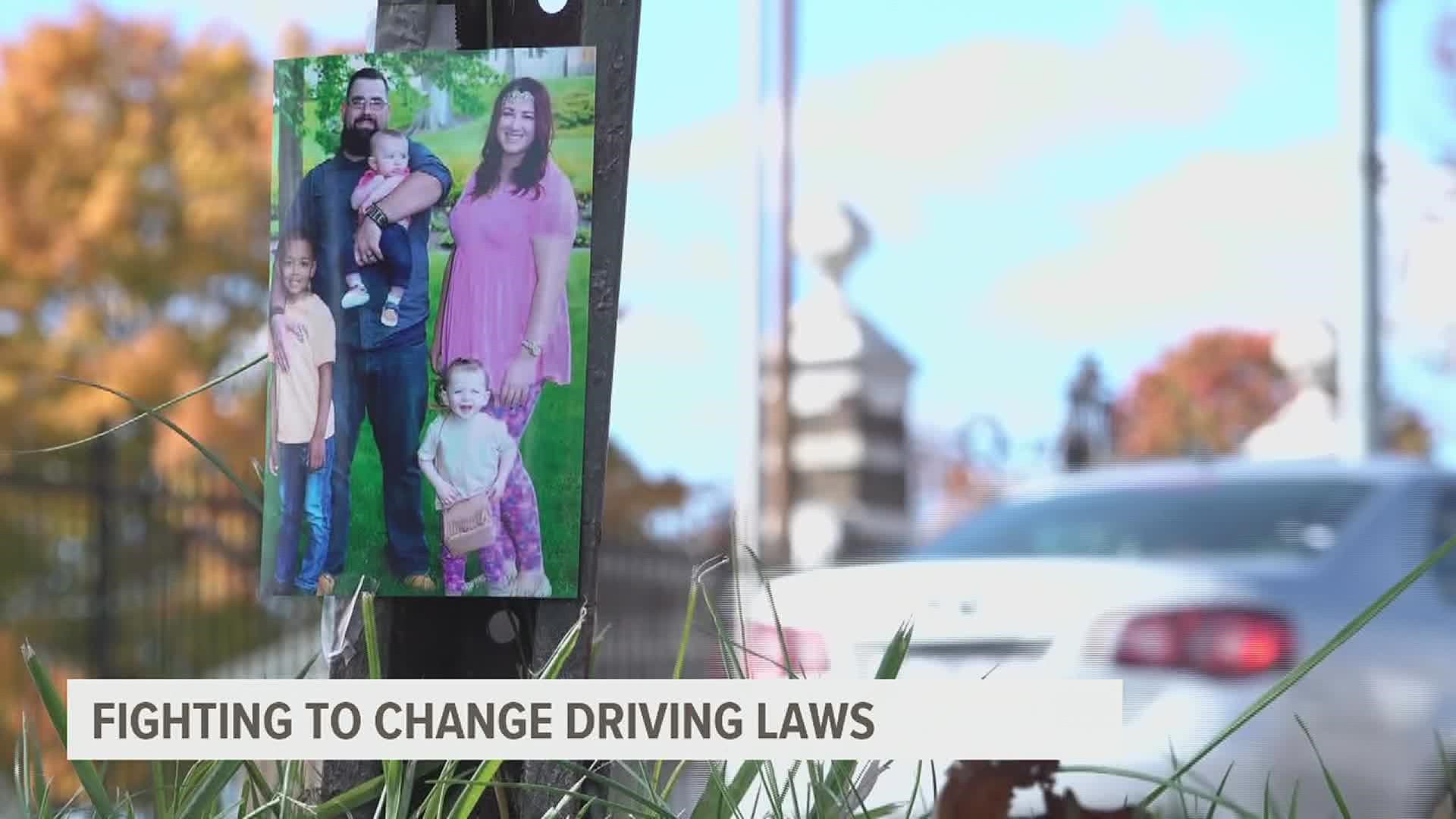HARRISBURG, Pa. — Outside Sandy Pittenturf's home in Mount Joy Borough in Lancaster County is a reminder of what her family is fighting for.
There used to be small American flags in a long row along the front lawn. Her son, Joshua, served in the U.S. Army for 12 years; two tours in Iraq and one in Afghanistan.
Today, a lone sign sits in the center of the yard, with her son Joshua's face, smiling. Beneath it, reads his name, and the years 1985-2020. Next to it is a message in big, bold letters: "TAKE A BREAK TO STAY AWAKE #PreventDrowsyDriving."
Joshua Bishop died on May 14, 2020 when he was hit and killed by a driver who told police he fell asleep at the wheel. Bishop was setting up traffic cones when, according to police, a car driven by Aaron Miller, of York, rammed into Joshua at 36.7 miles per hour, pinning him against the back of his SUV.
Miller was charged with homicide by vehicle, vehicular manslaughter, reckless driving, and careless driving. Miller also had no prior criminal history and is a veteran of the U.S. Air Force. According to Joshua's widow, Phyllicia, the York County District Attorney told her, if convicted, Miller would be looking at between 9 and 18 months in prison.
Gregg Freeburn, a personal injury lawyer based in Harrisburg, says it's not uncommon for people in those situations to avoid jail time altogether.
"It has to be action that is deemed egregious or in complete conscious disregard for the safety of other individuals on the roadway in order to fall into the category where someone would be charged with a crime that would send them to jail," Freeburn said.
Phyllicia Bishop and her mother-in-law, Sandy Pittenturf, felt that wasn't good enough.
Bishop reached out to her elected representatives, State Representative David Hickernell and State Senator Ryan Aument, in the hopes of convincing them to write new legislation to get Pennsylvania to enforce more strict penalties on drivers who cause death in crashes involving a fatigued driver.
"Even though Joshua lost his life because of this, look how many other lives he will be changing," Phyllicia said. "We loved Joshua so much, we don't want his death to be in vain for no reason."
Phyllicia reached out to Hickernell in October 2020 and heard back immediately. He said he'd look into changing the statute. Bishop wrote back citing statistics from the National Highway Traffic Safety Administration about drowsy driving. She also cited a CDC study which states someone who gets behind the wheel of a car after being awake longer than 24 hours is similar to having a blood alcohol level of 0.10 percent. Hickernell again responded, saying he passed along information to the House Judiciary Committee.
Phyllicia never heard back until FOX43 reached out to Rep. Hickernell's office in October 2021. He wrote back to Bishop saying the current statutes allow prosecutors to enforce drowsy and fatigued driving in decisions.
Hickernell's office declined FOX43's interview request, adding Ms. Bishop was free to share the contents of those emails.
Senator Aument never responded to Ms. Bishop, and never returned FOX43's requests for comment.
Pennsylvania law does not specifically mention sleep or drowsy driving in its statutes, unlike New Jersey and Arkansas, which Phyllicia hopes Pennsylvania can mimic.
"The bottom line is, drowsy driving, according to the experts, is just as dangerous as someone driving under the influence of alcohol," said State Senator Jason Rapert, of Arkansas.
He helped write the bill in 2013 which gave Arkansas prosectors the ability to charge drivers in fatal crashes with negligient homicide if they have been without sleep for 24 hours, or have fallen asleep at the wheel after going without sleep for that long. Penalties range from 5 to 20 years in prison.
New Jersey was the first to pass a sleep driving ordinance, with 2003's Maggie's Law. This came six years after Maggie McDonnell, a college student, was killed after she was hit head-on by a driver who fell asleep and crossed multiple lanes of traffic.
Maggie's Law allows prosecutors to enforce vehicular homicide under the same 24-hour rules. Those convicted can face up to 10 years in prison with a $100,000 fine.
"I think this helps deter people," said New Jersey State Senator Linda Greenstein, who helped write Maggie's Law. "Obviously, this is an a crime that happens every day. Accidents happen and they all don’t result in death, but something this serious resulting in death, I have a feeling that there is a lot of deterrence with this."
The issue with deterrance, much like the issue with charging someone with these crimes, is proof.
There is no statistical evidence these rules specifically lead to fewer drowsy driving related crashes. Senator Greenstein did not have available figures as to how often Maggie's Law had been used since it was implemented in 2003, and Arkansas has only used its statute three times since it was signed into law in 2013.
"What type of evidence do you draw on to show that someone has been awake longer than 24 hours and shouldn’t have been on the road?" asks Freeburn.
Proof may be hard to come by, but all Phyllicia Bishop and her mother-in-law Sandy Pittenturf want is a chance to be heard. Despite the emails from Representative Hickernell, they say they wish they had the chance to speak to him in person, instead of a few emails over a one-year-span.
"He was short and to the point with his email and went on his day," Phyllicia said. "But I can't get on with my day."

